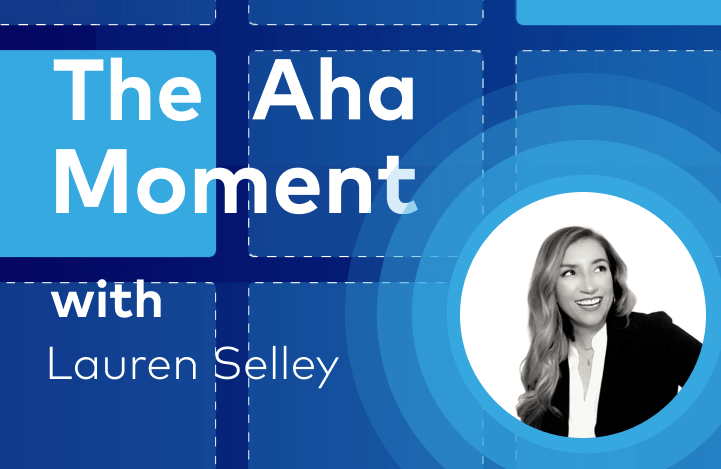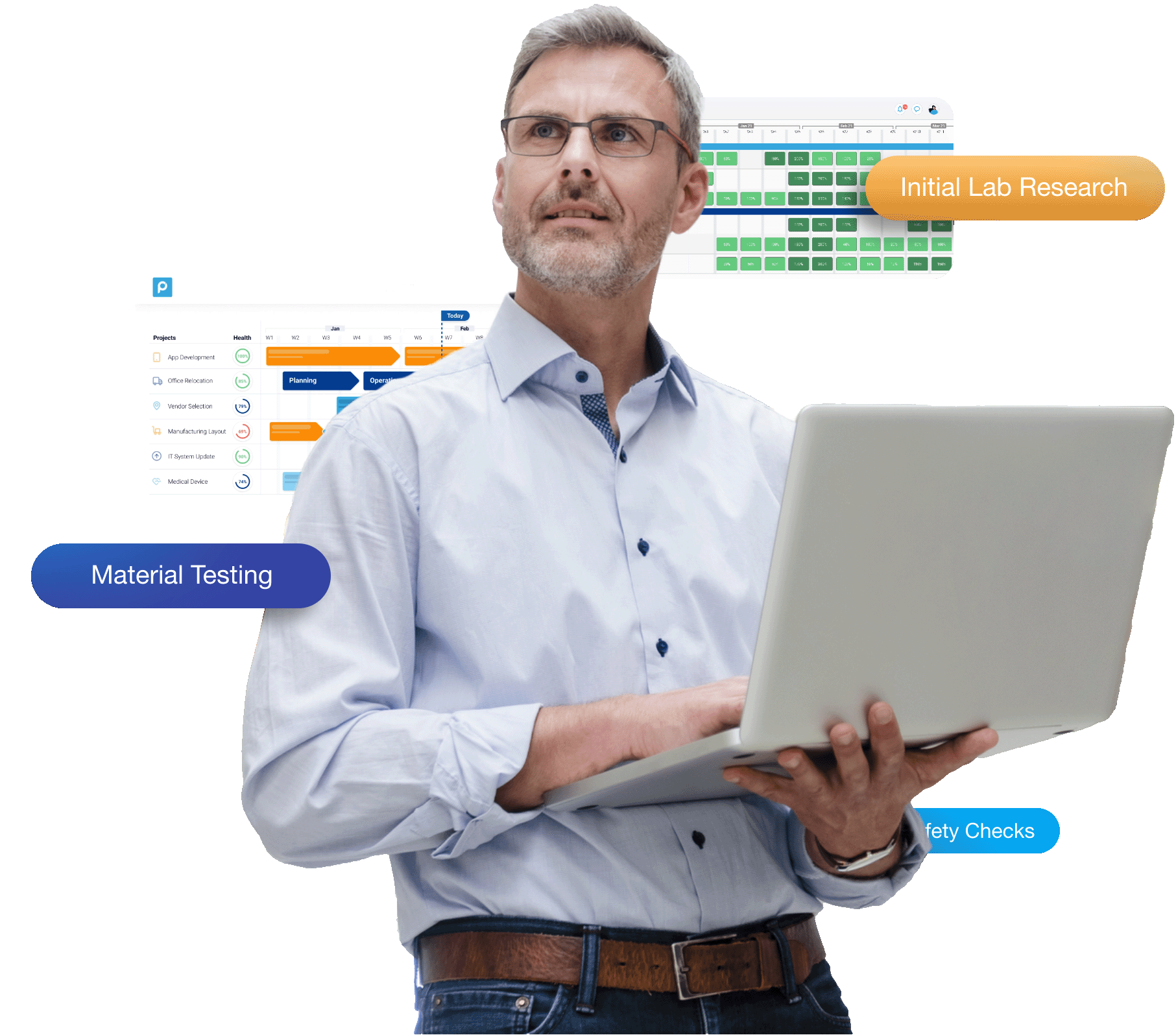The ‘Aha’ Moment: PM Influencer Series

In our series, The Aha Moment, we chat with influencers in the PM & PPM space and get to know them better. We ask a bunch of questions, some biz related and some not so biz related, in order to understand what makes them tick and find their aha moment.
This month’s feature is Portfolio Management Pro, Lauren Selley. Read on to learn how her background as a coding whizz kid paved the way for a career as a business analyst, and eventually Project Portfolio mastermind!
Professional Stuff….
Q. What is your job title and in which industry are you working in?
A. I’m a a Director of Portfolio Management, currently at Code & Theory. I work in Tech and have been helping build Web & Mobile Solutions for about 14 years.
Q. What is something unique that most people don’t know about you?
A. In my 20s I lived and volunteered at the sloth sanctuary in Costa Rica where we cared for over 150+ sloths! It was an amazing experience!
Q. What led you to this career?
A. I started becoming interested in coding when it was popular to customize your Myspace or build personal websites back in the early 2000s! My ability to understand more technical concepts gave me a unique edge when interviewing for my first Tech job as a business analyst and the rest is history.
Q. What is your biggest challenge in your profession? How do you overcome it?
A. One of the primary challenges in my profession is addressing the widespread confusion between the “Waterfall” and “Agile” methodologies. This misunderstanding has led to considerable difficulties within our industry. Agile methodology, known for its flexibility and rapid adaptability, became a popular trend among company leaders. However, it’s important to recognize that Agile isn’t suitable for every project, particularly those with fixed scopes and timelines. To overcome this challenge, we focus on educating our teams and stakeholders about the appropriate applications each methodology, and of hybrid approaches. By clarifying when and how to use them effectively, we can better align our project management strategies with the specific needs of each project, ensuring more efficient and successful outcomes.
Q. In your experience, why do projects fail or fail to meet their deadlines?
A. In my experience, projects often fail or miss their deadlines due to premature estimation and commitment. Teams are frequently required to provide estimates and quotes for large-scale engagements before thorough discovery. These estimates are based on limited information, typically gathered from a few initial client calls. When a project is approved and signed off based on these early estimates, teams find themselves constrained by pre-determined budgets and timelines. This leaves little flexibility for adjustments based on new insights or changes in project scope that often arise during the actual work. Consequently, the project may struggle to fit within these rigid parameters. Overcoming this challenge hinges on transparency and effective expectation setting, which are crucial aspects of project management.
Q. What’s the most annoying thing about project status meetings?
A. The most frustrating aspect of project status meetings arises when they are not taken seriously or disregarded by stakeholders. Ideally, these meetings are incredibly beneficial, offering transparency into any project concerns. However, their effectiveness diminishes when stakeholders fail to engage or listen actively. It’s essential for success that both sides, the project team and the stakeholders, act as partners, fully participating and collaborating, regardless of whether the project is progressing smoothly or facing challenges. This partnership is key to ensuring that project status meetings are productive and valuable.
Q. What’s the most difficult thing about managing stakeholder expectations?
A. One of the most challenging aspects of managing stakeholder expectations is finding the right balance in communication. It’s crucial to use language that is neither too defensive, which can seem like constantly shutting down ideas or concerns, nor too vague, which can lead to misunderstandings or unrealistic expectations. The key is to be clear and decisive in communication while also being receptive and understanding of stakeholders’ perspectives. This approach ensures that expectations are managed effectively without closing the door on constructive dialogue or leaving room for confusion about project objectives and outcomes.
Q. What advice would you give to up-and-coming professionals like yourself?
A. In today’s rapidly evolving work environment, the ability to learn and adapt is crucial. Embrace the fact that the teams you work with, the projects you undertake, and the global landscape are constantly changing. Stay curious and open-minded, seeking out new knowledge and skills relevant to your field. This could be through formal education, online courses, workshops, or learning from peers and mentors. Moreover, be prepared to pivot when necessary. The strategies and approaches that work today might not be as effective tomorrow. Stay flexible in your thinking and planning. Embrace change as an opportunity for growth and innovation, rather than a hurdle. By cultivating these qualities, you’ll be well-equipped to navigate the complexities of your profession and make meaningful contributions to your field.
Fun Stuff
Q. What three items would you choose if stranded on a desert island?
A. A good float with cup holder, a solar powered fan and a slush puppy machine, because who doesn’t love a slush puppy?
Q. Spring, summer, fall or winter?
A. Fall, easily and always. The season that has it all. Football, food, flannel… foliage. What more is there to want?
Q. If you could choose to do anything for a day, what would it be?
Waking up in a cozy ranch cabin to a warm cup of coffee that I can sip on the front porch while overlooking the mountains. Enjoying a long relaxing day of trout fishing and horseback riding before coming back to eat and relax around the campfire. Basically a day on the show Yellowstone… without all of the politics. Perfection.
Q. What is your go-to Karaoke song?
A. Oh wow, its a range. “You Can Call Me Al (Paul Simon),” “Forgot About Dre (-Dr. Dre) ,” “500 miles (-The Proclaimers) are all favorites but I’m not going to limit myself! Just have to keep the vibe going.
Q. What’s the best piece of advice you’ve ever received, and did you follow it?
A. Never keep a compliment to yourself. I live by it. Also to remember the handwritten thank you notes. I always keep a box on hand.
If you want to connect with Lauren and gain key insights from his expert ppm content, look her up on LinkedIn. Thank you Lauren for hanging out with us and answering our questions!

